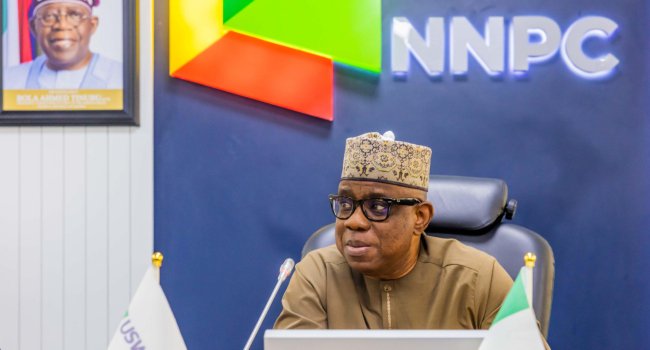THE Nigerian National Petroleum Company Limited (NNPCL) has received ₦318.05 billion between January and August 2025 to fund frontier oil exploration projects across Nigeria’s inland basins, even as the Federation Account struggles with declining revenue, documents from the September Federation Account Allocation Committee (FAAC) have revealed.
The deductions, drawn automatically from 30 per cent of Production Sharing Contract (PSC) profits, were in line with provisions of the Petroleum Industry Act (PIA) 2021, which created the Frontier Exploration Fund.
Under the Act, NNPCL channels 30 per cent of its PSC profits into exploring under-explored basins such as Anambra, Bida, Dahomey, Sokoto, Chad, and Benue, while a separate 30 per cent deduction goes to its management fees.
Analysis of FAAC records seen by News Point Nigeria showed that PSC profits between January and August 2025 stood at ₦1.06 trillion, significantly lower than the ₦1.58 trillion budgeted, leaving a ₦518.76 billion shortfall.
Despite the gap, the statutory 30 per cent deduction for frontier exploration was applied consistently, accumulating ₦318.05 billion within eight months. The same amount was also deducted for management fees, bringing NNPCL’s total receipts from PSC profits to ₦636.1 billion.
The monthly allocations fluctuated sharply:
January: ₦31.77bn
February: ₦38.30bn
March: ₦61.49bn
April: ₦36.58bn
May: ₦38.80bn
June: ₦6.83bn (lowest)
July: ₦25.34bn
August: ₦78.94bn (highest)
Meanwhile, the Federation Account—entitled to 40 per cent of PSC profits—received just ₦424.07bn year-to-date, far short of its ₦631.57bn budget, worsening Nigeria’s fiscal pressures.
In July, the Nigerian Upstream Petroleum Regulatory Commission (NUPRC) unveiled a Frontier Basin Exploration and Development Plan, signed by its Chief Executive, Gbenga Komolafe.
The plan detailed seismic surveys, wildcat drilling, and reappraisal work across basins, including:
Logging and testing of the Eba-1 well in the Dahomey Basin, Drilling of a new wildcat in Bida Basin, Reappraisal of Wadi wells in the Chad Basin, and
Reassignment of Ebeni-1 well drilling in the Benue Basin.
Komolafe said the outcomes of these activities would guide further exploratory drilling and de-risking of assets.
Despite the huge deductions, FAAC documents showed growing unease among stakeholders. A special FAAC subcommittee has demanded detailed financial records from NNPCL, the Central Bank of Nigeria, and NUPRC, insisting on full disclosure of projects undertaken before and after the PIA.
NNPCL has been directed to submit the information by September 19, 2025, though the process was still described as “work in progress.”
Tanimu Yakubu, Director-General of the Budget Office, earlier warned that Nigeria had lost nearly 60 per cent of gross oil revenue to PIA deductions, describing the 30 per cent allocations to NNPCL as unsustainable.
“Once the Act came into effect without new revenue sources to replace the loss, we lost a sizable part of what used to fund 80 per cent of public expenditure,” Yakubu said at a stakeholders’ meeting in Abuja.
He disclosed that oil revenues underperformed badly in the first half of 2025 due to lower prices and output, and confirmed that moves were underway in the National Assembly to amend the PIA.
At the last Federal Executive Council (FEC) meeting, President Bola Tinubu directed a comprehensive review of revenue retention practices by agencies including NNPCL, FIRS, Customs, NUPRC, and NIMASA.
He specifically ordered the Economic Management Team, led by Finance Minister Wale Edun, to reassess NNPCL’s 30 per cent frontier fund and management fee deductions, with a view to unlocking more resources for public spending.
The President said the move was part of ongoing reforms aimed at restoring fiscal credibility, boosting investor confidence, and enhancing savings.
The Petroleum and Natural Gas Senior Staff Association of Nigeria (PENGASSAN) and the Nigeria Union of Petroleum and Natural Gas Workers (NUPENG) strongly opposed any attempt to strip NNPCL of its role in exploration or amend the PIA hastily, warning such policies could destabilise the oil industry and threaten workers’ welfare.
But energy analyst Ademola Adigun, CEO of AHA Strategies, described the 30 per cent allocation as “unrealistic and too high.” He argued that frontier funding should not exceed 10 per cent, stressing that NNPCL’s deductions starved the Federation Account of revenue at a time of economic hardship.
Professor Dayo Ayoade, an energy law expert at the University of Lagos, agreed on the need for accountability but warned against tearing up the PIA. He urged that frontier exploration should be liberalised and handed to private investors willing to take the risk, instead of relying on public funds.
“The current funding structure is not sustainable,” Ayoade said. “NNPCL should not be spending government money on speculative projects. Private investors should take that role, with proper incentives.”
With ₦318.05 billion already channelled into frontier exploration in just eight months, the debate over how Nigeria funds its oil search is heating up. While government defends the deductions as necessary for long-term energy security, critics argue that the policy undermines fiscal stability at a time when the country urgently needs revenue to fund pressing social and economic priorities.
The coming months are expected to determine whether Tinubu’s review will lead to a recalibration of the Petroleum Industry Act or a tightening of oversight on NNPCL’s use of the controversial fund.







